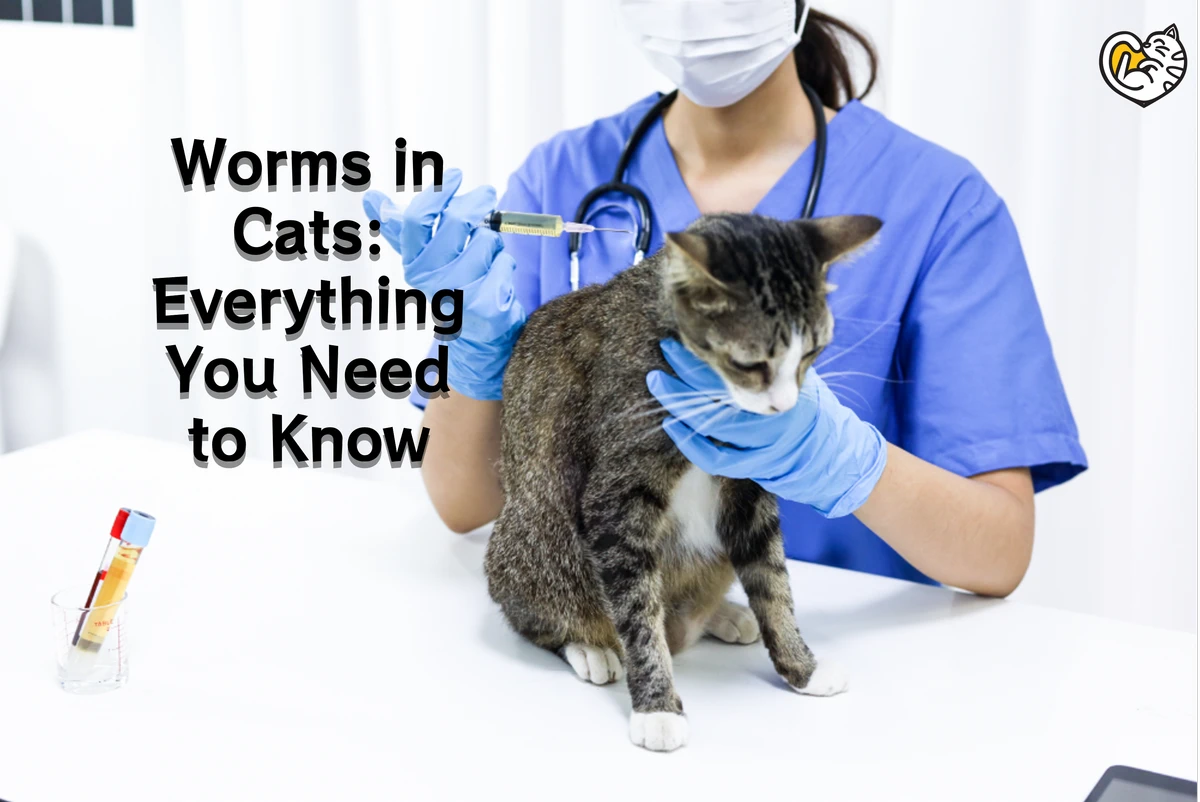Worms in Cats: Types of Cats Worms, Causes and Symptoms


Worms in cats is a common issue among cats, but unlike us, our pets can't vocalize their discomfort, making it crucial for us to be vigilant about signs indicating the presence of worms in our pets. Detecting signs of discomfort can be challenging, but it's essential to address the issue promptly to prevent unnecessary suffering.
While the risk of worms is lower in adult cats, it's essential to prioritize their well-being. Regular checkups with a veterinarian are crucial, as symptoms may not always be apparent. For kittens, whose immune systems are not fully developed, the consequences of worm infestation can be severe. Due to the lack of obvious symptoms, regular veterinary checkups become even more critical.
Visiting the vet for checkups allows for the identification of symptoms or relevant tests to pinpoint the type of worm causing the infection. Tailored treatment plans can then be administered, ensuring the health and happiness of your beloved kitten. In the absence of vocalized pain, our responsibility as pet owners is to stay observant, seek professional guidance, and take proactive measures to keep our feline companions worm-free and thriving.
Uncovering that your cat has worms can indeed be startling. Whether internal or external, these parasites can severely impact your cat's well-being. However, with accurate diagnosis and appropriate treatment, you can effectively address and eliminate worms in cats.
Is Your Cat Picky About Food?
Well, my cats used to be like that too, but now they finished the food all the time!
If your cat doesn’t want to eat the food or finish the food you gave, I have a solution for you. Read my true story here.
The Common Types of Worms in Cats
Various types of cat worms, such as roundworms, tapeworms, hookworms, and heartworms, can pose serious threats to your cat's health. Roundworms and tapeworms, in particular, can hinder normal growth and lead to persistent digestive problems, causing discomfort and abdominal bloating due to gas formation.
Heartworms, triggered by mosquito bites, may not always manifest physical symptoms, but vomiting and weight loss are common indicators. Continuous blood suction by heartworms can result in anemia, posing a life-threatening risk. If your cat exhibits signs such as loss of appetite, weight loss, or diarrhea, it could be a clear manifestation of worm infestation.
Understanding the various types of worms that can affect your cat is crucial for maintaining their health. Here's a breakdown of the most common intestinal parasites found in felines:
- Roundworms: These are prevalent and easily visible to the naked eye, resembling spaghetti noodles. Measuring three to five inches long, they steal nutrients from your cat's food and produce eggs, which are then expelled through feces. Keep an eye on your cat's poop or vomit, as roundworms may occasionally be visible.
- Tapeworms: Flat and ribbon-like, tapeworms are found inside the intestine. Segments resembling small grains of rice or sesame seeds may appear in your cat's stool. Contracted by ingesting fleas or infected prey, these worms mature in the intestine, with segments expelled through feces. Look out for them in feces or on the fur near the anus.
- Heartworms: Potentially lethal, heartworms infest the heart, blood vessels, and lungs, transmitted through mosquito bites. Unfortunately, there is no cure for heartworm in cats, making monthly preventatives the only form of protection.
- Lungworms: Contracted through contaminated water or consuming infected prey, lungworm larvae travel to the lungs, developing into adult worms. Symptoms, such as respiratory problems, can be mistaken for other conditions like bronchitis or pneumonia. Fortunately, lungworm is relatively uncommon.
- Hookworms: These small parasites attach themselves to the intestine lining using hook-like teeth, feeding off your cat's blood. Cats contract hookworms through ingestion, skin penetration by larvae, or transmission from the mother. While less common, they are particularly harmful due to the potential for intestinal bleeding. Symptoms may include pale gums/nose and a lack of energy.
- Bladder Worms: Uncommon, with no distinct clinical signs, severely infected cats may show symptoms of urinary tract infections or diseases. These worms are expelled through your cat's urine.
- Stomach Worms: Transmitted through the vomit of an infected cat, these are common in free-roaming or multi-cat households. Symptoms include loss of appetite, chronic vomiting, weight loss, and malnutrition. Thankfully, stomach worms are easily treatable.
- Whipworms: Rare in North America, whipworm infections occur when a cat ingests eggs found in various sources. Symptoms may include weight loss, digestive issues, and bloody diarrhea.
- Liver Flukes: Primarily affecting warm subtropical areas, these parasites infect cats through a complex life cycle involving intermediate hosts such as snails, lizards, and frogs.
Remember, despite its name, ringworm is a fungal disease affecting the skin and hair. In the following sections, we'll focus on the most common intestinal worms: roundworms, tapeworms, and hookworms.
The Signs and Symptoms of Worms in Cats
Detecting the signs and symptoms of worms in cats is crucial for prompt intervention. Both indoor and outdoor cats, regardless of age, can contract worms. Adults may acquire worms from contaminated feces, fleas, or rodents, while younger kittens can be exposed through nursing.
Here are the key indicators that your cat may be infested:
- Visible Presence: The first noticeable sign for many cat owners is the presence of worms in your pet's stool or vomit. Whole worms, parts of worms, or worm eggs may be visible. Worms or eggs can also migrate to the cat's anus, becoming entangled in the fur.
- Change in Coat: Parasite infestation can result in a dull, rumpled, or clumped coat due to nutrient deficiency or dehydration.
- Change in Color of Gums: Healthy cats should have pink gums. If the gums appear pale or white, it could indicate anemia, often associated with worm infestations.
- Changes in Energy Level: A sudden loss of energy in your kitten can be a significant indicator of worms. If your lively and attention-seeking cat becomes lethargic or withdrawn, it may signal a problem.
- Change in Stool/Bowel Movements: Dark, tarry stool may indicate the presence of blood, possibly from hookworms. Worms in the gut can also lead to diarrhea.
- Vomiting: While vomiting is common in cats, an increase in frequency may signal a worm infestation.
- Increased Appetite Despite Weight Loss: Worms deprive cats of essential nutrients, prompting an increased appetite as the cat tries to maintain body condition.
If you observe any of these signs, it's crucial to have your cat examined by a veterinarian immediately. Early detection and treatment are key to ensuring the health and well-being of your feline companion.
How do Cats get Worms?
Cats can acquire worms through various means, and the transmission methods may differ for each type of worm. Here are the primary ways cats get worms:
- Fecal Transmission: Worms are often transmitted through contact with contaminated feces. Cats may ingest worm eggs or larvae present in the environment.
- Ingesting Infected Hosts: Cats can contract worms by ingesting infected hosts such as birds, rodents, reptiles, or insects.
- Flea Transmission: Cats with fleas may groom themselves and inadvertently swallow fleas, which can carry worm larvae.
Can Cats get Worms from Dogs?
Yes, cats can contract worms from dogs, typically by ingesting feces from an infected dog.
Can Humans get Worms from Cats?
Yes, humans can contract worms from cats through direct contact with infected feces or soil. Practicing good hygiene, especially when gardening, walking barefoot in potentially infected soil, or playing in sandboxes, is essential for prevention.
Are Worms Painful for Cats?
Worms can cause discomfort for cats, particularly those with heavy parasite loads. Gastrointestinal symptoms like vomiting, diarrhea, and cramping may lead to discomfort. Additionally, certain worm larvae traveling through internal organs can cause inflammation and further distress.
Diagnosing Worms in Cats
Fecal testing is crucial for diagnosing worms in cats. Veterinarians use a stool sample to separate parasite eggs from feces, examining them under a microscope to identify the specific type of worm. Physical exams and blood work may also be conducted for a comprehensive assessment of the cat's health.
How to Treat Worms in Cats / Tapeworms in Cats Treatment
Deworming medication is the primary treatment for worms in cats, targeting both larvae and adult worms in the intestines. Multiple doses may be necessary to interrupt the parasite's life cycle. Following the veterinarian's instructions for dosage and administration is crucial.
What Happens if Worms Go Untreated in Cats?
Untreated worm infestations can lead to severe health issues in cats, including malnutrition, anemia, and intestinal obstructions, which can be life-threatening. Timely treatment is essential to prevent complications.
Preventing Infestation in Cats
After treatment, maintaining a year-round flea prevention regimen can reduce the risk of tapeworm infection. Regular deworming, especially for outdoor cats and avid hunters, can prevent infestations. Keeping the litter box clean and practicing good hygiene, including wearing gloves when cleaning, helps protect both cats and humans.
Preventive Measures for Cat Worm Infection
By adhering to these preventive measures, you can ensure your cat can lead a healthy and normal life.
- Maintain Personal Hygiene and Clean Environment:
- Regularly clean your environment to minimize the risk of worm infestations.
- Ensure personal hygiene by washing hands thoroughly after handling your cat or cleaning the litter box.
- Thorough Cleaning After Outdoor Activities:
- After a day out, both you and your kitten should be cleaned thoroughly to prevent potential infections.
- Monitor Feces for Signs of Worms:
- Regularly inspect your cat's feces for any visible signs of worms, allowing for prompt intervention if needed.
- Prevent Predation on Infected Animals:
- Ensure your pet kitten does not prey on smaller animals that may carry cat worms, minimizing the risk of infection.
- Include Preventive Medicine in Daily Food:
- Administer preventive medicine prescribed by the veterinarian as part of your cat's daily diet to proactively combat potential worm infections.
- Monthly Vet Checkups:
- Schedule monthly checkups with your veterinarian to monitor your cat's health and detect any signs of worms early on.
- Frequent Stool Tests or Deworming:
- Conduct frequent stool tests or follow a deworming schedule as recommended by your veterinarian. This proactive approach has proven to be highly effective in preventing worm infections in your beloved kitten.
By incorporating these practices into your routine, you can create a protective environment for your cat, reducing the likelihood of worm infestations and ensuring a vibrant and healthy life for your feline companion.
Conclusion for Cat Worms
In conclusion, understanding the nuances of worms in cats, including the types, causes, symptoms, and treatment, is essential for responsible pet ownership. Cats, whether indoor or outdoor, can be susceptible to various worm infestations, each presenting unique challenges. Recognizing the signs, such as visible presence in feces, changes in coat or gums, vomiting, and alterations in bowel movements, is crucial for early intervention.
The causes of worm infestations range from contact with contaminated feces to ingesting infected hosts or fleas. Importantly, cats can contract worms from dogs, emphasizing the need for vigilant care in multi-pet households. While worms can indeed cause discomfort, timely diagnosis and treatment through deworming medication, prescribed and administered by a veterinarian, are highly effective in restoring feline health.
Preventive measures, such as maintaining personal hygiene, keeping environments clean, regular veterinary checkups, and avoiding potential sources of infection, contribute significantly to a cat's well-being. Additionally, incorporating preventive medicine into their daily routine and conducting frequent stool tests or deworming can further safeguard against worm infestations.
By adopting these practices, cat owners can create a health-conscious environment for their feline companions, ensuring not only a prompt response to potential worm issues but also fostering a happy and thriving life for their beloved pets.
Do you know the biggest challenge faced by cat owners?
It’s not what you think. Find out the answer here (before it’s too late).





